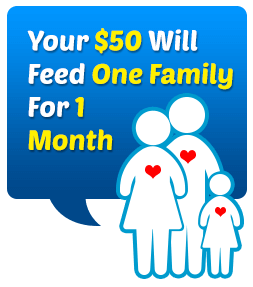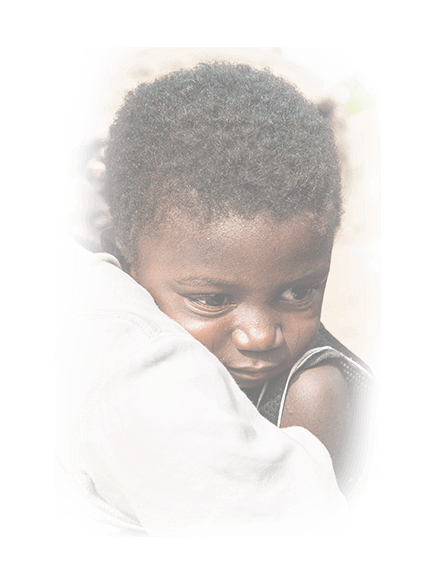

The COVID pandemic has affected all of us in one form or another. You've undoubtedly had to adjust to new lifestyle changes, whether they've encompassed a shifting landscape at work or school, a sense of isolation from friends and family, or perhaps even some increased financial burden. All of these issues are real, and impact our world greatly.
They call the pandemic "the COVID crisis," and maybe the effects of this virus have felt like a crisis in your own life. But for little towns like Alumaku – the village where Fr. Onunwa was born and raised -- the term "crisis" couldn't be more fitting.
With strict lockdown laws in place, residents of Alumaku — a remote and impoverished village in Nigeria — have suffered greatly. Villagers haven't been able to leave their homes to buy food, and the devastating results are malnutrition and a stalled economy.
Since the beginning of the pandemic, Fr. Paschal has received dozens of desperate phone calls from villagers, starving and begging for money for food. This type of scenario truly gives new meaning to the term "crisis," and highlights one of the key differences between the comforts of our own pandemic world and the devastation of pandemic life for residents of Alumaku.
- Able to purchase food in grocery stores, and take-out from restaurants;
- Still has resources to feed family members, and has economic power;
- Access to doctors and hospitals when ill, and receive treatment;
- Able to go to parks and beaches (for outdoor exercise).
- Suffering from extreme hunger due to economic devastation (no money for food);
- No medical services available in the village;
- Intermittent power (no refrigeration in most homes);
- Complete lock-down, with no permission to be outside of the home.

We have temporarily redirected our efforts away from our micro-loan program and are focusing our current efforts to support the village during this food crisis. Please remember that with your monetary donations, village families can maintain a minimal level of sustenance, which is all they are asking for!
Our goal is $50 per month per family to provide basic nutrition throughout the pandemic, and we anticipate that these funds will be needed for at least 3 months.
Please help with this urgent need for the poor in Alumaku, Nigeria. All donations are tax-deductable. Thank you so much for your compassion, and may God bless you for your generosity and prayers.
NVE Projects
Fr. Onunwa has traveled to his home village, Alumaku, annually for many years. Working with the town’s elders a number of projects have been identified that would not only provide jobs, but also provide products and services needed by the local community.
Below is a summary table of these projects followed
by a more detailed description of each.
| Project Description | Estimate Cost | Complexity |
|---|---|---|
| Pig Farming | $ 1000 | +++ |
| Vegetable Garden | $ 500 | ++ |
| Snail Farming | $ 500 | + |
| Motorcycle Taxi | $ 1,600 | + |
| Palm Nut Oil Mill | $ 6,000 | ++++ |
| Garri Processing Mill | $ 6,600 | + |
| Tailoring Business | $ 800 | ++ |
| Poultry Farming | $ 2,000 | +++ |

Pig Farming
It is estimated that over 80% of the pork consumed in Nigeria is imported. Establishing 5-10 small pig farms will not only provide employment for village residents, it will also provide a reliable source of protein for the community. The estimated cost is $1000 per project. It will employ up to 4 people per family farm.

Vegetable Gardening
The growing season in southern Nigeria is long and multiple crops can be planted and harvested over its duration. Greens, garden eggs, tomatoes, red & green peppers, spinach, and yams are some of the items commonly grown. The major limitation is proximity to a water supply for irrigation.
Each farm will provide the economic means of supporting a family.

Snail Farming
Due to recent advancements in this field, cultivating snails for food has become economically viable and is a profitable business enterprise. Each farm is capable of supporting a single family. NVE seeks to fund 12-15 of these start-up businesses.

Motorcycle Taxi
Many roads in Nigeria are in poor condition and most are not paved. This includes the village of Alumaku and nearby communities. A motorcycle is a good all-terrain vehicle that can navigate bad roads and is an inexpensive option for providing motorized travel when people cannot easily walk to their destination. The start-up cost for a motorcyle-taxi business is $1600. NVE plans to provide financing for 4 of these businesses.

Palm-Nut Oil Mill Project
For millions of Nigerians, oil palm cultivation is a way of life – indeed it is part of their culture. Different parts of the Palm Oil tree are used for different purposes. The focus of this project is to create palm oil from the palm kernel or nut. The process involves the cracking of the nut, separating of the shells, washing, cleaning, digesting, and pressing to produce palm oil. The estimated cost to establish such a business is $6000 and it will provide employment for 5 people.

Garri Processing
Garri, also known as Yucca in Spanish, is like Cream of Wheat and is a food staple in the village. Garri production is a low-cost, traditional process that can be done on a small scale. To produce garri, fresh cassava tubers are washed, peeled, mashed, fermented, and fried to produce the coarse-grained product. The estimated start up cost for this business is $6600 and it will employ 4 people.

Tailoring Business
A family tailoring business can provide additional income to families. NVE plans to provide financiing so that individuals can acquire the equipment and materials necessary to set up a tailoring business. Each start-up will cost approximately $800 and NVE plans to support 5 such businesses.

Poultry Farming
Chickens provide two sources of food: eggs and meat. Both are widely consumed throughout Nigeria. This business will provide employment, food, and income for one family. There are two significant start-up costs: the acquisition of land and the construction of a building. The estimated cost to fund this project is $2,000. NVE plans to support up to 10 such poultry farms.